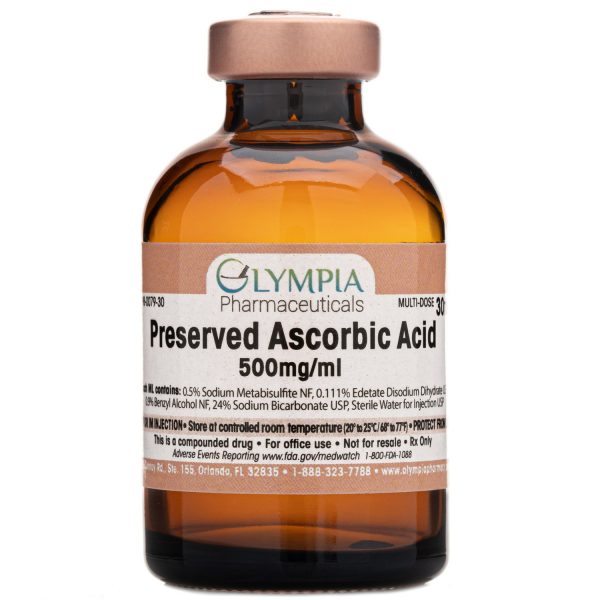
Ascorbic acid, also known as vitamin C, is an antioxidant that plays an important role in the body: it protects the body’s cells from damage. It is also necessary to maintain the health of skin, teeth, bone, cartilage, and blood vessels. Studies have shown that it may help brain function in people with cognitive impairments such as Alzheimer’s disease and dementia. Without the proper amount of ascorbic acid, people are at risk for cardiovascular illness, compromised immune systems, premature aging, increased stress response, and low energy. Ascorbic acid is found in foods such as citrus fruits, kiwi, broccoli, tomatoes, leafy vegetables, potatoes, brussels sprouts, raw bell peppers, and strawberries. Most people get sufficient ascorbic acid through their diet. Others may not be able to absorb enough through diet or ingestible supplements. In these cases, injections may be prescribed.
Ascorbic acid is one of many antioxidants that can protect against damage caused by harmful molecules called free radicals, as well as toxic chemicals and pollutants like cigarette smoke. Free radicals can build up and contribute to the development of health conditions such as cancer, heart disease, and arthritis. Ascorbic acid may also be beneficial for patients with colds, macular degeneration, inflammation, skin aging, and in those who have suffered from a stroke.
Dosage: Seek advice from a licensed physician, medical director, or other healthcare provider
Concentration: 500mg/ml
Route of Administration: IV/IM
Before taking ascorbic acid, make sure to tell your doctor or pharmacist if you have any allergies, kidney disease (such as kidney stones), diabetes, are on anti-coagulation therapy, on a sodium-restricted diet, or have a certain enzyme deficiency called G6PD deficiency. It is said to be safe to use during pregnancy in recommended doses. If clearly needed, higher doses can be used in pregnancy. Risks and benefits should be discussed with your healthcare provider. Ascorbic acid does pass through in breast milk safely when used in recommended doses. This vitamin may interfere with certain lab tests (including certain glucose tests), possibly causing false test results.
Stop using Ascorbic Acid and call your doctor right away if you experience any:
Some common side effects include:
Store at controlled room temperature. Protect from light.

Get your dream body now, pay later with Cherry!
Choose your payment plan before your next appointment- won’t harm your credit!

Get your dream body now, pay later with Cherry!
Choose your payment plan before your next appointment- won’t harm your credit!
7155 East Main Street, Scottsdale, AZ 85251
Phone: 602-456-9201
Text: 602-492-5736
E-mail: info@studio48medspa.com
Monday – Thursday 9:00 AM – 6:00PM
Friday: 9:00 AM – 3:30 PM
Every other Saturday: 9:30 AM – 4:00 PM
Sunday: Closed
*Studio 48 Medspa Scottsdale’s hours of operation are subject to change. Please call or book your appointment ahead of time to ensure availability. Walk – ins are welcome, but service availability is not guaranteed.